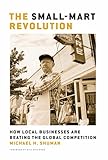The small-mart revolution : how local businesses are beating the global competition / Michael H. Shuman.
Material type: TextPublisher: San Francisco : Berrett-Koehler, c2006Description: x, 285 p. ; 25 cmISBN: 1576753867; 9781576753866; 9781576754665 (pbk.); 1576754669 (pbk.)Subject(s): Small business -- United States | Import substitution -- United States | Globalization -- Economic aspects -- United StatesDDC classification: 338.6/420973 LOC classification: HD2346.U5 | S55 2006Online resources: Publisher description | Contributor biographical information
TextPublisher: San Francisco : Berrett-Koehler, c2006Description: x, 285 p. ; 25 cmISBN: 1576753867; 9781576753866; 9781576754665 (pbk.); 1576754669 (pbk.)Subject(s): Small business -- United States | Import substitution -- United States | Globalization -- Economic aspects -- United StatesDDC classification: 338.6/420973 LOC classification: HD2346.U5 | S55 2006Online resources: Publisher description | Contributor biographical information | Item type | Current library | Call number | Copy number | Status | Notes | Date due | Barcode |
|---|---|---|---|---|---|---|---|
 Books
Books
|
Female Library | HD2346 .U5 S55 2006 (Browse shelf (Opens below)) | 1 | Available | STACKS | 51952000103202 | |
 Books
Books
|
Main Library | HD2346 .U5 S55 2006 (Browse shelf (Opens below)) | 1 | Available | STACKS | 51952000132608 |
Includes bibliographical references (p. 245-270) and index.
Foreword / Bill McKibben -- Introduction : from Wal-Mart to Small-Mart -- pt. 1. The gathering gale -- 1. Wreckonomics -- 2. The LOIS alternative -- 3. Amazing shrinking machines -- pt. 2. The Small-Mart patriots -- 4. Consumers -- 5. Investors -- 6. Entrepreneurs -- 7. Policymakers -- 8. Community builders -- 9. Globalizers -- Appendix A : The fall and rise of small-scale competitiveness -- Appendix B : The scale of existing business by payroll.
"Defenders of massive multinational chains like Wal-Mart and Fortune 500 big business argue that, like it or not, there is no alternative. But in The Small-Mart Revolution, Michael Shuman shows that the benefits these megastores and huge corporations supposedly deliver to communities are illusory. Crunch the numbers and you'll find that locally owned businesses turn out to be much more reliable generators of good jobs, economic growth, tax dollars, community wealth, charitable contributions, social stability, and political participation. Unlike their global competitors, they do this without massive tax breaks and subsidies that often put local economies in a permanent hole.
Plus, contrary to popular belief, local businesses are competitive with the multinationals - and gaining ground every day. Shuman highlights numerous trends that are making the old "bigger is better" economies-of-scale argument obsolete, and he describes a variety of innovative strategies these businesses are using to successfully compete with their oversized competitors. He also shows how consumers, investors, and policymakers can support their own communities by "going local.""--BOOK JACKET.
1 2

There are no comments on this title.